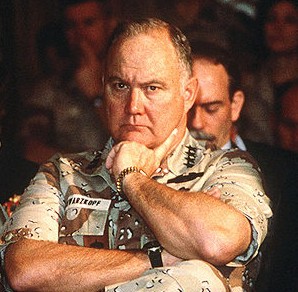
The Gulf War was a war waged by coalition forces from 35 nations led by the United States against Iraq in response to Iraq's invasion and annexation of Kuwait arising from oil pricing and production disputes. It was codenamed Operation Desert Shield for operations leading to the buildup of troops and defense of Saudi Arabia and Operation Desert Storm in its combat phase.

The War Powers Resolution is a federal law intended to check the U.S. president's power to commit the United States to an armed conflict without the consent of the U.S. Congress. The resolution was adopted in the form of a United States congressional joint resolution. It provides that the president can send the U.S. Armed Forces into action abroad only by declaration of war by Congress, "statutory authorization," or in case of "a national emergency created by attack upon the United States, its territories or possessions, or its armed forces."

The Authorization for Use of Military Force Against Iraq Resolution of 2002, informally known as the Iraq Resolution, is a joint resolution passed by the United States Congress in October 2002 as Public Law No. 107-243, authorizing the use of the United States Armed Forces against Saddam Hussein's Iraq government in what would be known as Operation Iraqi Freedom.

Edward Randall Royce is an American politician who served as a member of the United States House of Representatives from California from 1993 to 2019. A member of the Republican Party, Royce served as Chairman of the United States House Committee on Foreign Affairs from 2013 to 2019. He previously served as a member of the California Senate from 1982 to 1993.

The 4th Marine Division is a reserve division in the United States Marine Corps. It was raised in 1943 for service during World War II, and subsequently fought in the Pacific against the Japanese. Deactivated after the war, the division was re-formed in 1966 and elements of the division deployed during the Gulf War in 1990–1991. It is currently the ground combat element of the Marine Forces Reserve and is headquartered in New Orleans, Louisiana and has units throughout the United States.

Al Udeid Air Base is one of two military bases southwest of Doha, Qatar, also known as Abu Nakhlah Airport. It houses Qatar Air Force, United States Air Force, Royal Air Force, and other Gulf War Coalition personnel and assets. It is host to a forward headquarters of United States Central Command, headquarters of United States Air Forces Central Command, No. 83 Expeditionary Air Group RAF, and the 379th Air Expeditionary Wing of the USAF. In 1999, the then Emir of Qatar, Sheikh Hamad, told U.S. officials that he would like to see as many as 10,000 U.S. servicemen permanently stationed at Al Udeid. According to media reports in June 2017, the base hosted over 11,000 U.S. and U.S.-led anti-ISIL coalition forces and over 100 operational aircraft.
The National Capital Memorial Advisory Commission is an independent agency of the United States government responsible for approving and siting memorials within Washington, D.C., and the D.C. metropolitan area. Previously known as the National Capital Memorial Advisory Committee, the agency was established by the Commemorative Works Act of 1986 and its name was changed to the National Capital Memorial Commission. The agency's name was changed again in 2003 to the National Capital Memorial Advisory Commission.

Gerald Edward Connolly is an American politician serving as the United States Representative from Virginia's 11th congressional district, first elected in 2008. The district is anchored in Fairfax County, an affluent suburban county west of Washington, D. C. Connolly is a member of the Democratic Party.

David Phillip Roe is an American politician and physician who was the U.S. Representative for Tennessee's 1st congressional district, serving from 2009 to 2021. He is a member of the Republican Party. From 2017 to 2021, Roe was chairman of the House Committee on Veterans Affairs.

The air campaign of the Gulf War, also known as the 1991 bombing of Iraq, was an extensive aerial bombing campaign from 17 January 1991 to 23 February 1991. The Coalition of the Gulf War flew over 100,000 sorties, dropping 88,500 tons of bombs, widely destroying military and civilian infrastructure. The air campaign was commanded by USAF Lieutenant General Chuck Horner, who briefly served as Commander-in-Chief—Forward of U.S. Central Command while General Schwarzkopf was still in the United States. The British air commanders were Air Vice-Marshal Andrew Wilson and Air Vice-Marshal Bill Wratten. The air campaign had largely finished by 23 February 1991 when the coalition invasion of Kuwait took place.

H.R. 1300 is a bill that was introduced into the United States House of Representatives during the 113th United States Congress. The bill would "extend through FY2017 the authorization of appropriations for volunteer services for programs conducted by the United States Fish and Wildlife Service or the National Oceanic and Atmospheric Administration (NOAA), community partnership projects for national wildlife refuges, and refuge education programs." The bill would authorize the appropriation of $6 million between 2015-2017.

The Veterans' Advisory Committee on Education Improvement Act of 2013 is a bill that would extend through the end of 2015 the Veterans' Advisory Committee on Education. It would also change the composition of people sitting on that board by including members from more recent wars. Committee members include veterans from various wars and experts in fields such as education and management. The bill was introduced into the United States House of Representatives during the 113th United States Congress.

The Distinguished Flying Cross National Memorial Act is a U.S. public law that designates a memorial located at March Field Air Museum in Riverside, California, as the Distinguished Flying Cross National Memorial, in honor of current and former members of the Armed Forces who have been awarded the Distinguished Flying Cross. The bill was introduced into the United States House of Representatives during the 113th United States Congress.
The October 2013 mini-continuing resolutions were a set of continuing resolutions that would have provided funding for a limited set of federal agencies during the United States federal government shutdown of 2013. The bills were part of a Republican strategy to fund portions of the government which have bipartisan support, in order to spare those agencies and programs from the effects of the shutdown. The bills all passed the United States House of Representatives during the 113th United States Congress, but were ignored by the United States Senate. These selective continuing resolutions became moot upon the passage of the Continuing Appropriations Act, 2014 which funded the entire government, ending the shutdown.

The Commission to Study the Potential Creation of a National Women’s History Museum Act of 2013 is a bill that would establish a commission to prepare a report containing recommendations for establishing and maintaining a National Women’s History Museum in Washington, D.C.. The 8-member commission would have 18 months to produce the report and submit it to the Congress.

The Carl Levin and Howard P. "Buck" McKeon National Defense Authorization Act for Fiscal Year 2015 was a National Defense Authorization Act. According to the House Armed Services Committee, which oversaw the legislation, the bill would be "the comprehensive legislation to authorize the budget authority of the Department of Defense and the national security programs of the Department of Energy." The total appropriations that are authorized amount to approximately $600 billion for fiscal year 2015.

The Honor Flight Act is a bill that would direct the Transportation Security Administration (TSA) to establish a process for providing expedited and dignified passenger screening services for veterans traveling on an Honor Flight to visit war memorials built and dedicated to honor their service.

The joint resolution "Approving the location of a memorial to commemorate the more than 5,000 slaves and free Black persons who fought for independence in the American Revolution" would approve the location of a commemorative work to honor the more than 5,000 slaves and free black persons who fought in the American Revolution.
The timeline of the Gulf War details the dates of the major events of the 1990–1991 war. It began with the Iraqi invasion of Kuwait on 2 August 1990 and ended with the Liberation of Kuwait by Coalition forces. Iraq subsequently agreed to the United Nations' demands on 28 February 1991. The ground war officially concluded with the signing of the armistice on 11 April 1991. However, the official end to Operation Desert Storm did not occur until sometime between 1996 - 1998. Major events in the aftermath include anti-Saddam Hussein uprisings in Iraq, massacres against the Kurds by the regime, Iraq formally recognizing the sovereignty of Kuwait in 1994, and eventually ending its cooperation with the United Nations Special Commission in 1998.

General Order No. 1 was a general order issued by General Norman Schwarzkopf Jr. to United States Central Command in the Middle East during the Gulf War. The order contains provisions restricting the behavior of troops and was intended to show respect to the laws of Saudi Arabia where many US troops were deployed. The order, for the first time in the US Army, prohibited the possession, manufacture, sale or consumption of any alcoholic beverage. It also restricted the possession of "sexually explicit" material, which was broadly defined and led to relatively innocuous documents such as underwear catalogues and bodybuilding magazines being banned. A ban on the taking of war trophies from Iraqi prisoners was later amended to permit US troops to retain captured bayonets as souvenirs. The order influenced those issued in later campaigns, many of which also include bans on alcohol consumption even where US troops are not deployed in Muslim countries.









